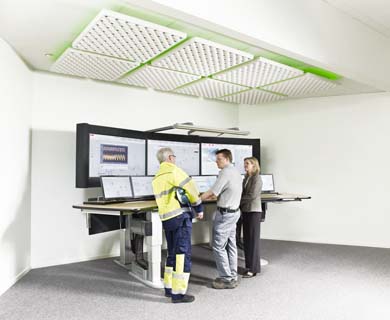
Salesforce Another Meeting of IT and OT
Here I go to yet another IT conference to talk convergence and platform. Salesforce invited me to its summer marketing conference in June and promised an interview with a Vice President. I could take my wife out to a good anniversary dinner, visit family, and go to a tech conference with a good interview all on one trip. Too good to pass up.
This was the Salesforce Connections conference. Not as big as Dreamforce in San Francisco, but still quite large by our standards in manufacturing.
Salesforce is more than the CRM company it was. Many acquisitions later, it has assembled an array of technology. Like all tech companies, it has a platform. In fact due to its open APIs, you could use it, too. Some time ago, I interviewed the CEO of a manufacturing ERP company called Kenandy that was build upon the Salesforce platform. Rootstriker, another ERP company build on the Salesforce platform, recently acquired Kenandy.
Featured in one keynote was an application by MTD, a manufacturer of lawn tractors (Cub Cadet, etc.). No, Salesforce doesn’t run machines. It does help connect the manufacturer with its end customers and then with its dealers with feedback to the manufacturer.
The idea is that customers do online research and so need to be reached in many ways (thus Salesforce marketing). MTD erected an online store on the Salesforce platform (in simplified terms) for direct to the consumer interaction. An order is fulfilled by the local dealer. The dealer still gets margin and relationship and as an extra added bonus, the opportunity for service business. Linking all back to MTD, it gets to know the customer, satisfies the dealer, plus receiving data from the service business feeds back into product development.
Achyut Jajoo, Salesforce VP automotive/manufacturing, told me industry is moving from product centric to system, e.g., autonomous vehicles, mobility services, digital signals; factory automation, geographic expansion, intelligence, vehicle sales. Mobility services lead to transaction service—over air updates, location based services.
He noted that people start online and mostly know what they want before visiting a dealer. Other manufacturing customers tying their whole sales systems back to manufacturing include John Deere and Ecolab.
“State of the Connected Customer” report
Before I went to the conference, Saleforce sent me this interesting report—a survey of over 6,700 consumers and business buyers worldwide that looks at the ever changing landscape of customers’ expectations, the emerging technologies influencing these expectations and the role trust plays in the customer experience.
Customers today are energized by tech innovations — but also plagued by deepening distrust of the companies that provide them. They have high expectations about what makes a great customer experience, and not a lot of patience for companies that fail to deliver.
These trends impact every company, regardless of whether they sell to consumers or business buyers purchasing on behalf of their companies. In this research, “customers” is an aggregate of both consumer and business buyer responses.
The report dives into the nuances of this tricky customer landscape. Here are five of the high-level findings our research brought to light:
1. Customer experience matters even more than you think
Eighty percent of customers say that the experience a company provides is as important as its products or services. A majority take this sentiment a step further by voting with their wallets; 57% have stopped buying from a company because a competitor provided a better experience.
2. B2B expectations mirror B2C standards
The concept of “B2Me” isn’t new, but it’s gathering steam. Eighty-two percent of business buyers want the same experience as when they’re buying for themselves. But only 27% say companies generally excel at meeting their standards for an overall B2B experience, signaling ample room to improve.
3. Companies face new connected mandates
For 84% of customers, being treated like a person — and not a number — is very important to win their business. Another 70% say connected processes are very important to win their business (such as seamless handoffs between departments and channels, or contextualized engagement based on earlier interactions).
Even before a purchase, personalization is hugely important; 59% of customers say tailored engagement based on past interactions is very important to win their business.
While they buy, 78% of business buyers seek salespeople that act as trusted advisors with knowledge of their needs and industry.
4. Technology sets new benchmarks for innovation
Real innovation, not lip service, is a deciding factor for most customers. 56% of customers (including 66% of business buyers) actively seek to buy from the most innovative companies.
While some emerging technologies are only starting to take root, a majority of customers say these technologies have transformed (or are actively transforming) their expectations: the Internet of Things (60%), voice-activated personal assistants (59%), and AI (51%).
5. Facing a crisis of trust: finding the balance between personalization and privacy
Sixty-two percent of customers say they’re more afraid of their data being compromised now than they were two years ago — and nearly half of customers (45%) feel confused about how companies use their data.
82% of customers will share relevant information about themselves in exchange for connections between their digital and in-person experiences.
81% of customers will share relevant information about themselves in exchange for more consultative help from salespeople.
85% of customers will share relevant information about themselves in exchange for proactive customer service.
For 92% of customers, the ability to control what personal information is collected makes them more likely to trust a company with that information.






